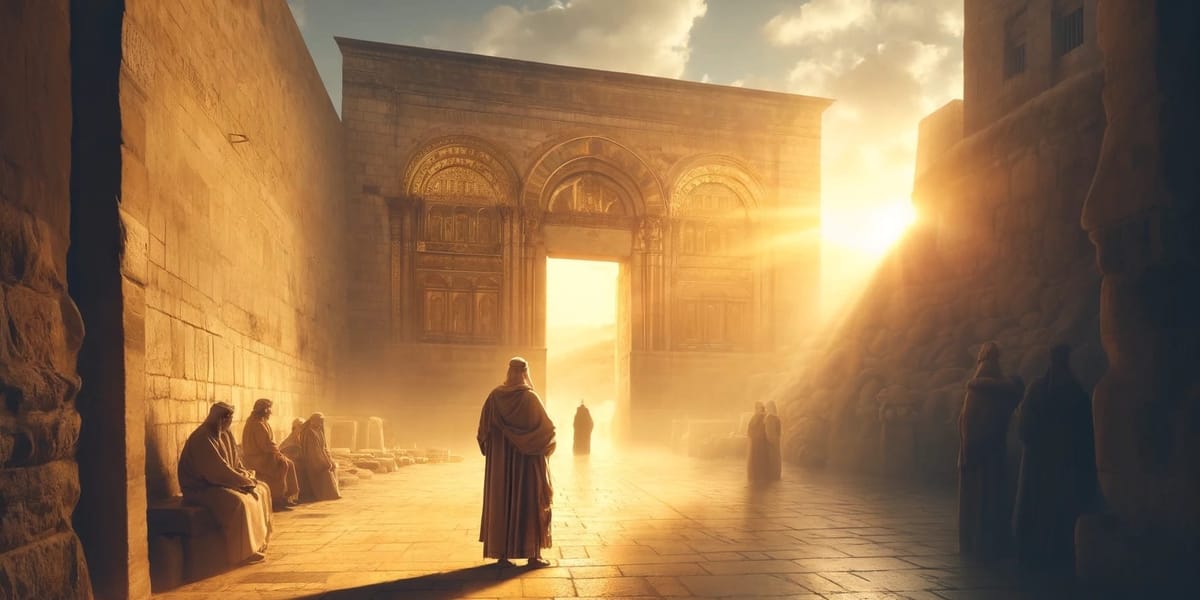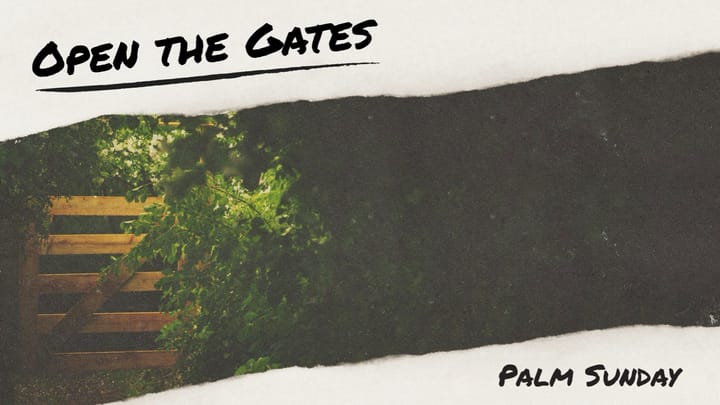Fairhaven Sermon 4-28-2024
Miracles disrupt societal norms, challenging power and inspiring faith, but often provoke discomfort among those accustomed to control.

In this week's sermon, Pastor Dylan Parson from Fairhaven United Methodist Church revisits a passage from Acts, emphasizing the radical and unsettling nature of miracles performed by the disciples Peter and John, who healed a crippled man. This miraculous act, despite its positive outcome, led to their trial by religious authorities. Pastor Dylan delves into the societal and spiritual implications of such actions, highlighting the discomfort and threat felt by those in power when confronted with divine acts that challenge established norms and hierarchies. He discusses how the healing not only brought physical restoration but also symbolically disrupted societal expectations, portraying the healed as no longer merely background figures but as active participants in their faith community.
Further exploring the theme of disruption, Pastor Dylan contemplates the broader implications of divine intervention, suggesting that true faith might lead to unforeseen and often unsettling changes within both individual lives and broader communities. He uses the example of the Asbury revival to illustrate how a genuine movement of the Holy Spirit can transform traditional practices and expectations, leading to widespread renewal and spiritual awakening. This transformative potential, however, comes with challenges, as it threatens the comfort and predictability many cherish in religious and social structures. Pastor Dylan calls for a readiness to embrace these divine disruptions, positing that a willingness to accept and foster such changes is essential for living out a faith that is truly aligned with the teachings and actions of Jesus.
Transcript
So you may or may not have noticed this morning that you heard the same Acts passage as last week because that one really stuck out to me and I wanted to make sure I got to talk about that one. And so we find ourselves as we go back into Acts, we've been doing a lot of the gospel readings, especially through the Easter season where Acts is filled in for the Old Testament. And so here in Acts, we find ourselves in yet another New Testament story that's pretty confusing. At least on the surface level of it.
So what we have here is a bunch of people who are mad about a miraculous healing. And here the disciples, specifically Peter and John in this story, are on trial because of something that has happened shortly before in the previous chapter. So in chapter three of Acts, Peter and John have healed a man who was crippled since birth. And so here we have a couple of people who were crippled since birth.
And this man was basically a panhandler. He had to beg in order to survive and whose friends or maybe even some sympathetic strangers would place him by the temple gate every morning so that he could beg for money or for other gifts from people who were heading into worship in prayer. So what happens then, they see him and Peter and John essentially yank him out of this state of sickness into a state of health and wholeness. Peter exclaims as he walks up to him, Look at us.
And the man does. He expects to be handed maybe a copper coin or something. And Peter says instead, While we don't have any money to give you, I will give you something else. And so Jesus, or Jesus, John grabs the man's hand and pulls and says, In the name of Jesus Christ, the Nazarene, get up and walk.
And the man does, immediately. His legs work properly for the first time in his life. And he uses them to the fullest. He doesn't just walk, but he runs.
He leaps around the courtyard here. He is overwhelmed with joy. He is praising God and naturally making quite a visible scene. Something has happened here and the people who've known him as nothing but a crippled beggar, kind of like a piece of furniture, a landmark, for decades know that something big has happened.
And Peter and John, unsurprisingly, have landed in the spotlight for this healing. And the spotlight's a pretty dangerous place to be, always, but especially then in Jerusalem. Because healing, like resurrection, is a crisis. It's a challenge.
And it is profoundly upsetting to people. Now, it doesn't seem right, does it? When you think about that at first, it doesn't seem right. It seems backwards. Who could possibly be mad about something so wonderful happening? The lame are walking, the blind are seeing, decades of bleeding stopped in an instant.
Jesus did that kind of stuff all the time. What's not to like about that? Well, here's the issue, is power. Healing broken bodies and spirits is something that you or I certainly cannot do by ourselves. No human being can do those things.
And so when it does happen, it's extremely threatening because it's a move of power. It's a threat, especially to the scribes, the priests, the rulers in the time of the early church. And it's always a threat to whoever in any place in time are supposed to be the ones with whom power rests. Notice what these people, who are essentially gathered as judges hauling Peter and John into court, notice what they ask them.
These are the high priests and their associates. They say, By what power or name did you do this? Did you do this healing? That is to say, who do you think you are? Peter and Paul have clearly struck a nerve here just by healing this man. The theologian Willie Jennings writes about this passage that what Jesus did and what the disciples are doing, which is fundamentally challenging the way things are, that some people are just beggars and some people are priests. This is nothing less than criminal.
And that makes sense because Jesus was crucified as a common criminal, right? So if we're walking in his footsteps, what is being done is criminal. And Jennings writes, Only criminals touch nerves at this level and receive the consequences. Just this healing has really touched a nerve. Because also keep in mind the people who are being healed, the kinds of people, the people who are healed and the people who are empowered to heal are the sick, the oppressed, the poor, the outcast, people who are supposed to be neither seen nor heard, people like that beggar who are just kind of in the background where they're supposed to be.
The crippled man at the gate is supposed to be this pitiful figure who just remains. He quietly holds his little cardboard sign. He's not supposed to be running around praising God, telling people about how Jesus' disciples healed him. That's not his job.
He's supposed to be there. What we see here instead is God intervening into the everyday affairs of human beings. And those who are used to controlling those affairs don't really like that very much. Peter comes right out and says that to them too when he's questioned by the scribes and the priests and the rulers.
He says, This man stands healthy before you because of the name of Jesus Christ the Nazarene, whom you crucified, but whom God raised from the dead. This Jesus, the stone you builders rejected has become the cornerstone. So put another way, Jesus did this thing. Jesus healed this man and you can't.
In fact, you're on the wrong side completely. You've tried to kill Jesus and not only is he no longer dead, he's ripping other people from the clutches of death into new life. So what does that leave you guys? The power of God's not gonna be controlled. It's not gonna be directed by the people who think they're in charge.
It will tear through the world like a forest fire. It'll knock down anything blocking its path. And so what does it mean if any believing person, which is what Peter is saying here, since it's not his power, but Christ's that's healed this man, what does it mean if any believing person can cause miraculous healing by calling on the name of Jesus? How does that destabilize things? The priests and the scribes and the rulers feel the ground crumbling beneath their feet. The potential for any lowly peasant to start healing the sick and the injured is almost as disorienting as Jesus refusing to stay dead.
Raising a man from the dead, healing somebody who's been crippled for untold decades just screams to the world, everything has changed. Nothing will ever be the same again. And that is really terrifying and unsettling because things aren't staying the way they're supposed to. And so you might be thinking in this story, oh no, not for me though.
I would love to see miracles like those. Why would somebody be mad about something like that? Would you? Are you sure? All of this kind of stuff still happens. So what would happen if people started being miraculously healed in this church? What if pain and depression and anxiety, chronic illness just vanished here because God decided to do it and we believe strongly enough to try? What if even beyond physical healing, lives started to be transformed here in a way that was visible to the outside world where people could see something was happening? And people started to show up on fire with the Holy Spirit. What if we start having new baptisms every week? I tell you what, things would get really different.
Things would get really different really quickly. Things would change. And you'd have new people taking your spot. We'd have new issues to deal with that we've never thought of.
Your Sunday morning wouldn't look the same. Church council is gonna have a whole new set of problems to deal with that we have zero experience in. And so if religion, if the church is primarily about consistency and tradition and our comfort, that's out the window when the Spirit gets to work. The scribes, the priests, the rulers found that out when John healed that beggar.
I strongly believe. I strongly believe that the tendency for those of us who are at least relatively comfortable with the way things are is to hope deep down in our hearts, even if we'd never say it out loud, to hope that things will stay more or less the same until we die. There is nothing we hate worse than a change we did not personally decide on. And that applies to pretty much everything in our lives.
It really does. It really does. The way the church operates, the songs we sing, the overall social order of our country, the way our neighborhood feels, who our neighbors are. We wanna keep those things.
Unfortunately, there is nothing that interrupts and overturns that sameness and stability more than God intervening, especially with a miracle. You and your life will be changed and you don't have a choice. It's impossible for God to do something in, around us, in spite of us, that doesn't rock the boat. That's what God does.
I preached about this last year, but it makes me think about the Asbury revival last spring. I spoke about it at the time. And what happened was that Asbury University in Kentucky, a historically Methodist school, students and professors had gathered for just a regular midweek chapel service like Christian colleges do. And that service just didn't end.
The Holy Spirit took over. People just kept worshiping. They just stayed. And they stayed for a month, night and day, the entire time.
And the whole time it was led by not professors, not pastors, not bishops, but college students. And it made its way out into the world. First via TikTok, and then the major newspapers picked it up. And soon 15,000 people a day were showing up at Asbury.
And that university chapel from all over the country, people came from as far as Russia, as far as Japan. And by the end of it, they had totaled 50 to 70,000 people on a campus of 1800 students. The Washington Post, I found the article about it the other day, reported at the time on people who were experiencing miraculous healing, both physical and from things like anxiety and anxiety, addiction, depression, suicidal thoughts, relationship problems. And then similar revivals like that started taking off around the country, at churches, at colleges, especially around the South and the Midwest, which is cool, but it was a wreck.
This is the important part. Campus was essentially closed down for a month. Hordes more people than the university was built to contain flooded the place to the point where the university administration actually closed down the chapel for anyone over the age of 26, because they wanted to insist that this was a student-led thing. There were all kinds of professional like worship bands, recording artists that volunteered to come and lead worship.
And the students said, No, this is us. This is what the Spirit is doing. Regular daily life ground to a complete stop for a month in the middle of the school year. This was February.
And the city government of Wilmore, Kentucky eventually got so deeply concerned about safety and security with all those people there, they started pushing the university, the realist thing in. And eventually the university decided that it was time to schedule an end to what they called the active phase of the revival. And almost a month after it began, they closed it down, closed the chapel down because this was just logistically impossible to maintain. There was just so much happening.
So many people, classes couldn't happen. The university was full. They had to stop it for logistical reasons. And this was huge, right? But as big as it was, this is just a flash in the pan sort of thing as far as revival and movement of the Spirit goes.
This was a month. There's nothing preventing a revival of the Holy Spirit from rippling across continents. That's what happened with the Wesley's Methodist revival in the 1700s. Started in a small community in Oxford and soon it was all across England, some people in Europe, all across North America, reached millions of people.
There were millions of Methodists by John Wesley's death and there weren't any until he was like 40. The Church of England, of course, didn't like that. They already existed. They thought they were doing just fine.
And then all this boat rocking started happening. And so we have to admit to ourselves, wouldn't it be easier if we just didn't have any miracles? Wouldn't it be easier if the Holy Spirit was nowhere to be found here because it starts doing stuff that we didn't ask it to? Wouldn't it be nicer if we just kept things the way that they are? If we prayed our absolute hardest that God's not gonna do anything crazy so we can sing our hymns and pass the plate and be in our cars to go home by about 1037? Wouldn't that be great? Sorry about the point of Acts, the whole book of Acts, but this story especially, is too bad. In the name of Jesus, by which Peter and John preach and heal and into which we're baptized, the name of Jesus holds the power of a nuclear bomb. You can feel the authorities responding to that all through Acts.
Healing and miracles and salvation are released into the world, even and maybe especially against our will. Against our will. It doesn't matter how heavy of a stone we put in front of the tomb in the hopes that Jesus is gonna leave us alone. It'll be moved aside in the name of Jesus.
I pray all the time, and this sounds negative, but it's not. I pray all the time that God is gonna shake this church to its foundation whether we like it or not. And I include that in my prayer. You know, whether I like it or not too, I really do.
It's not just, you know, you people thing. I hope God does something whether we like it or not. And what I will continue to try to do is lead and serve this congregation as if God's gonna do miraculous things in it, through it, and I believe God can and will. And I hope you'll serve the same way when you decide to serve this church.
Because from the bottom of my heart, I am telling you that this is the only way to be a follower of Jesus. Expect God is actually gonna do something in your life, in the church, in the world. Or just don't bother with the whole thing, right? When you pray, when you put some money in the offering plate, when you come to worship, when you come to church council, don't bother unless you want God to do something, unless you expect God to do something, unless you want God to do something with you and through you and knock down the stability, the predictability we cherish. That's one thing the church is good about, it's predictability.
But if you are not open to the same spirit that Jesus Christ, that raised Jesus Christ from the dead, if you're not interested in that working in you, don't bother. And this is what we have to understand, and it's something that the rulers, the priests, the scribes, all the authorities in Jerusalem understood quite clearly. This is why they're interrogating Peter and John. The good news of Jesus Christ is scary because it's gonna mess things up.
Those who crucified Jesus understood this deep in their bones. When God gets going, when God starts raising the dead, healing the sick and the infirm, the world is turned upside down. Whatever you thought you knew, you don't know anymore because God's doing something else. Whatever you expected tomorrow would bring, it's now completely unknown because you don't know what God's gonna do.
Whatever power and control you thought you had over your life and over the world, all of that's evaporated. You didn't have it to begin with. But Christ, the cornerstone, takes the reins. That's scary, that really is.
But here as the rulers and priests did what Peter says to them, listen to this. Salvation can be found in no one else. Throughout the whole world, no other name has been given among humans through which we must be saved. Trust in that name, call on that name, and then watch out.
In the name of the Father and the Son and the Holy Spirit, amen.


